Key takeaways:
- Mental health significantly influences emotional well-being and interpersonal interactions; acknowledging emotions and practicing mindfulness are essential for regulation.
- Mental health awareness reduces stigma, encourages support networks, and empowers individuals to seek help.
- Establishing daily routines, practicing mindfulness, and connecting with nature are effective strategies for managing stress and nurturing resilience.
- Building resilience through goal-setting, strong social connections, and a growth mindset can help navigate challenges during uncertain times.
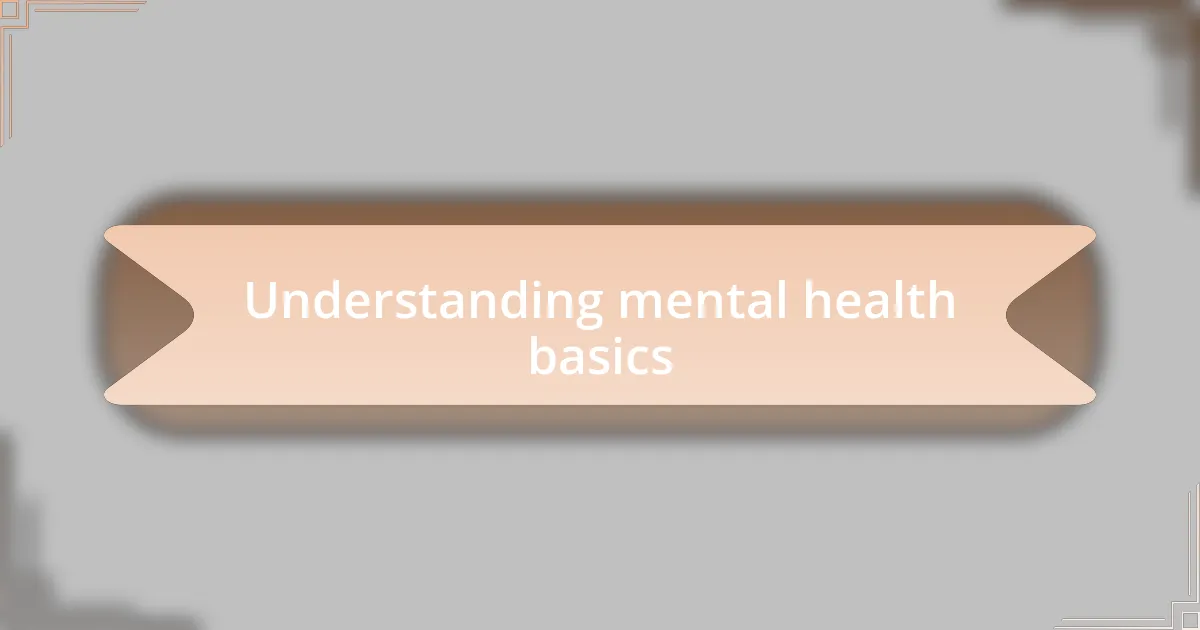
Understanding mental health basics
Mental health is an essential aspect of our overall well-being, influencing how we think, feel, and interact with others. During the lockdown, I found myself reflecting on the importance of mental health more than ever. It made me wonder: how often do we prioritize our mental state in the hustle of daily life?
One of the key components of mental health is emotional regulation. I remember days when I felt overwhelmed by anxiety, often triggered by uncertainty and isolation. I started to recognize that acknowledging these feelings was the first step toward managing them. How do we learn to accept our emotions without judgment? For me, practicing mindfulness made all the difference.
Lastly, understanding the concept of resilience is crucial. Resilience is our ability to bounce back from adversity, and I learned that it comes in waves. There were moments I felt strong and capable, while other times, I struggled. It’s perfectly okay to experience a range of emotions, and I came to realize that asking for help speaks volumes about our strength. What strategies have you developed to cultivate resilience in your own life?
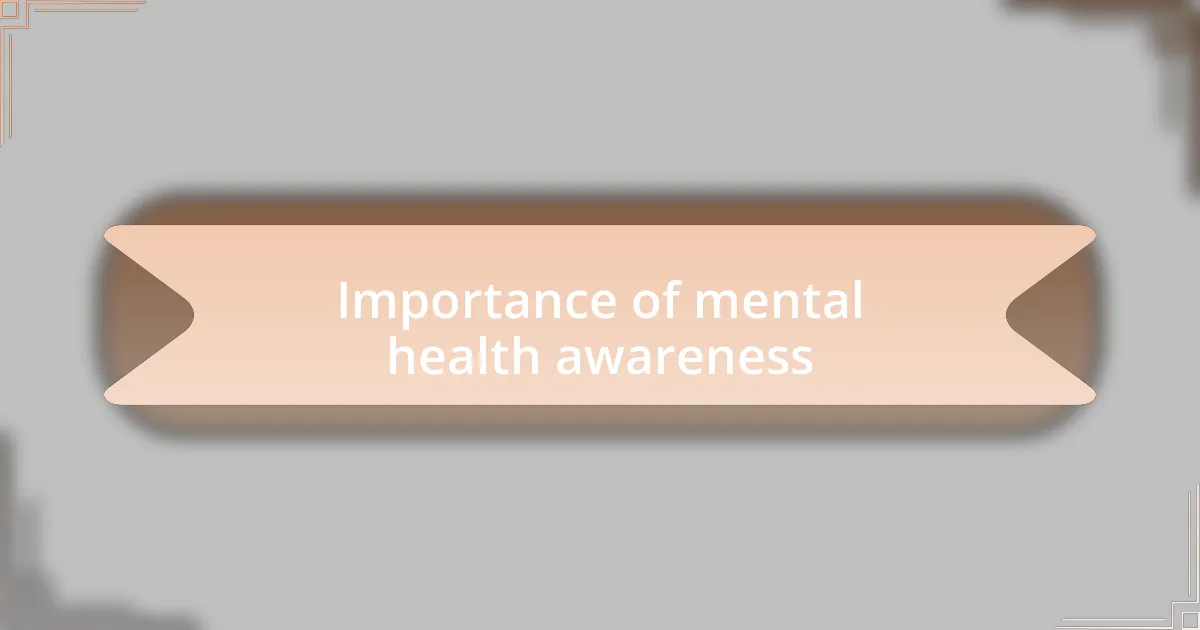
Importance of mental health awareness
Mental health awareness is crucial because it helps destigmatize those conversations we often shy away from. I recall a moment during lockdown when I opened up to a friend about my struggles with anxiety. Sharing my experiences not only lightened my emotional load but also encouraged her to reveal her own battles, highlighting how validation and understanding can foster a supportive community.
When we prioritize mental health awareness, we empower individuals to seek help and create a robust support network. I remember reading about someone who felt isolated during lockdown, but as they began to share their story online, they connected with others facing similar challenges. This ripple effect of openness can lead to positive change, transforming personal struggles into a source of collective strength.
Moreover, greater awareness can lead to more accessible resources and professional help. Have you ever felt uncertain about where to turn for support? That was my experience until I began looking into local mental health organizations during lockdown. By advocating for mental health awareness, we don’t just help ourselves; we pave the way for others to find the help they need.
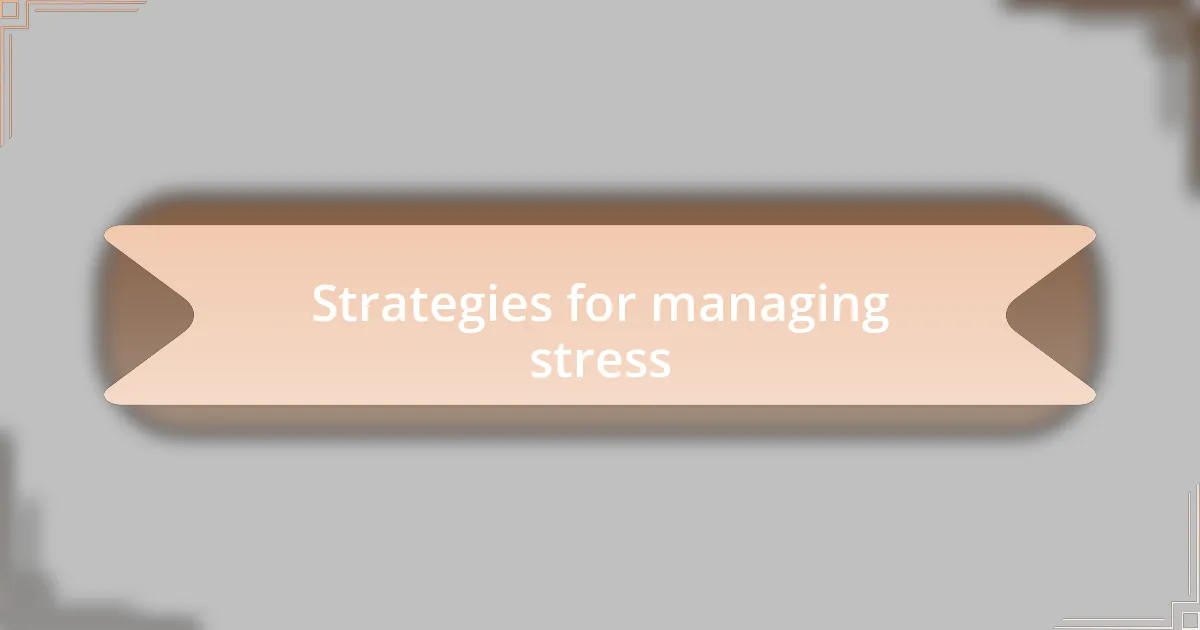
Strategies for managing stress
One effective strategy I found for managing stress during lockdown was establishing a daily routine. This structure helped bring a sense of normalcy amidst the chaos. I remember setting aside specific times for work, exercise, and relaxation, which made those long days feel more balanced and less overwhelming.
Another approach that worked wonders for me was practicing mindfulness. I started incorporating short meditation sessions into my day. Initially, it felt challenging to quiet my mind, but gradually, I noticed I could focus better and handle stress more effectively. Have you tried mindfulness? It truly can change your perspective.
Connecting with nature also became a vital part of my stress management strategy. I’d go for daily walks in my neighborhood, immersing myself in the sights and sounds around me. There’s something incredibly calming about fresh air and a change of scenery. Each walk left me feeling rejuvenated and more equipped to tackle whatever challenges lay ahead.
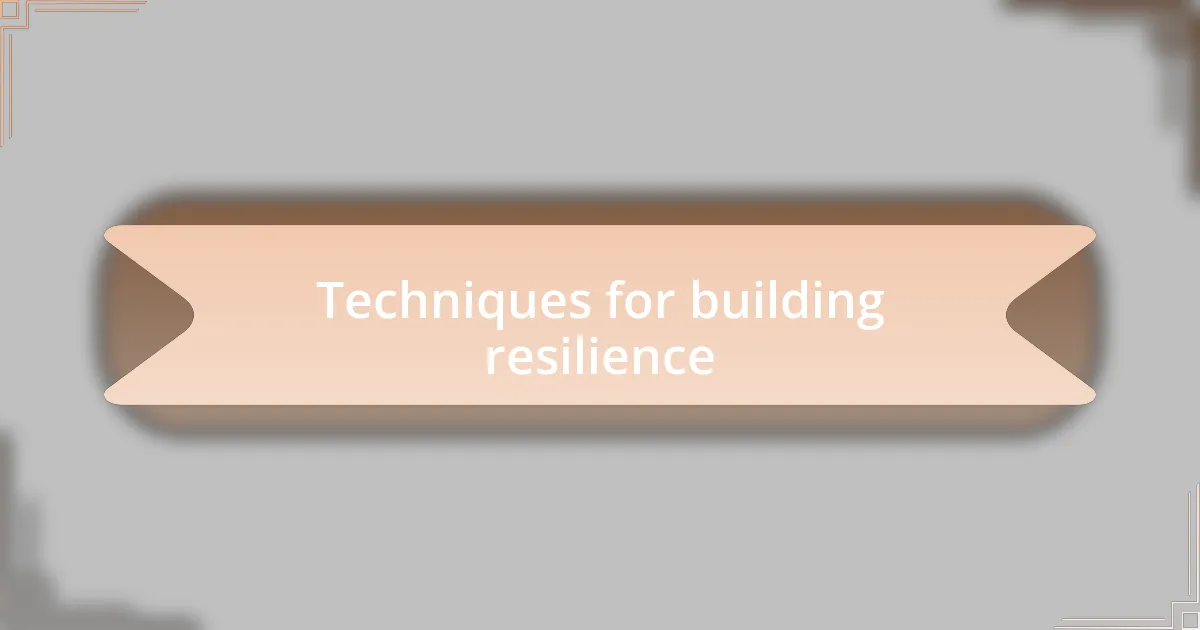
Techniques for building resilience
Building resilience during lockdown became essential for maintaining my mental health. One technique I tapped into was goal-setting, which allowed me to focus on small, achievable objectives. Each time I ticked off a task, whether it was reading a book or learning a new skill, I felt a boost of accomplishment that lifted my spirits. I often wonder, how empowering is it to take control of your own progress in times of uncertainty?
Another key method was fostering strong social connections, even if it meant shifting to virtual platforms. I made a point to host weekly video calls with friends and family. These conversations often felt like lifelines, reminding me that I wasn’t alone in my struggles. It was fascinating how sharing our experiences brought a sense of solidarity, despite the physical distance. Have you ever experienced the comfort of simply connecting with someone who understands your situation?
Lastly, embracing a growth mindset played a significant role in my resilience journey. I regularly reminded myself that challenges are opportunities for growth. Each setback during lockdown was a chance to learn and adapt. Reflecting on these moments, I found myself more open to change and less fearful of the unknown. Isn’t it remarkable how shifting our perspective can transform our experiences?
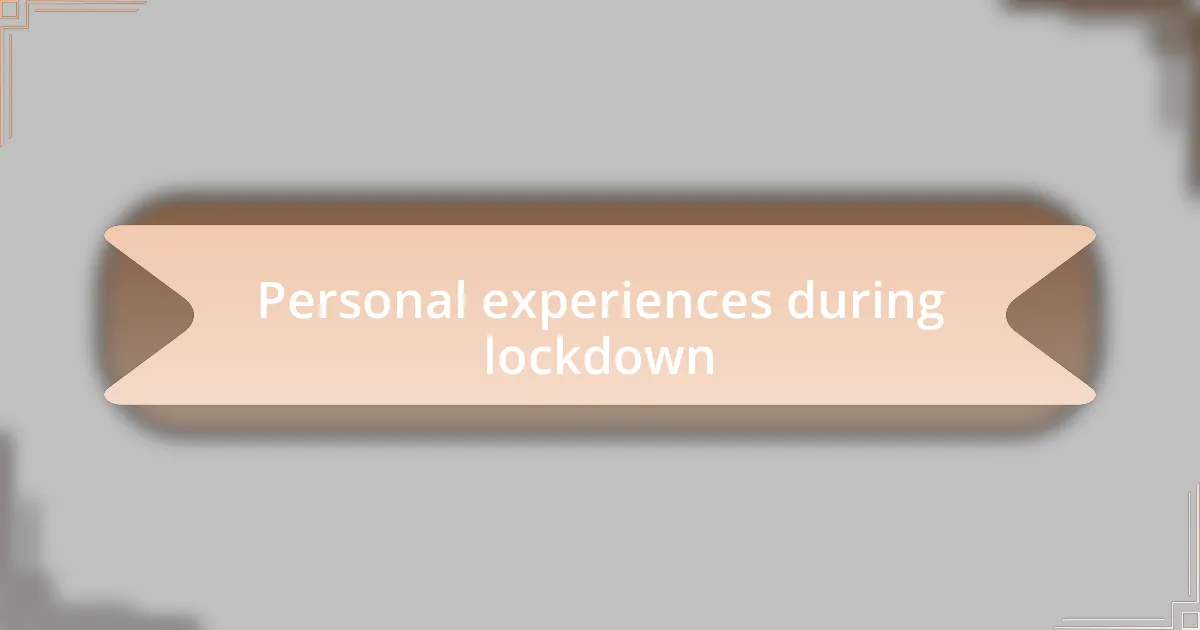
Personal experiences during lockdown
During lockdown, I found myself navigating a whirlwind of emotions, often feeling anxious and isolated. One instance that stood out was when I got lost in a creative project—a painting I had started in my living room. As the colors blended on the canvas, I realized how therapeutic art could be, helping me express feelings that were otherwise difficult to articulate. Have you ever felt such relief from pouring your heart into something tangible?
On days when motivation was hard to muster, I turned to journaling. I still remember the weight of those first few entries, where I poured out my worries about the future and the uncertainty surrounding everything. Over time, putting my thoughts on paper became a release—a way to process my feelings and track my journey. It was like having a conversation with myself that allowed for clarity and reflection. Can writing transform thoughts that feel overwhelming into something manageable?
I also developed a newfound appreciation for nature during those months. I would take daily walks in my neighborhood, soaking in the sights and sounds that went unnoticed before. One afternoon, as I watched the trees sway gently in the breeze, I felt a sense of connection to my surroundings. This simple act of stepping outside became a vital part of my routine, reminding me of the beauty still present even amid chaos. Do you ever find that stepping outside can completely shift your mindset?
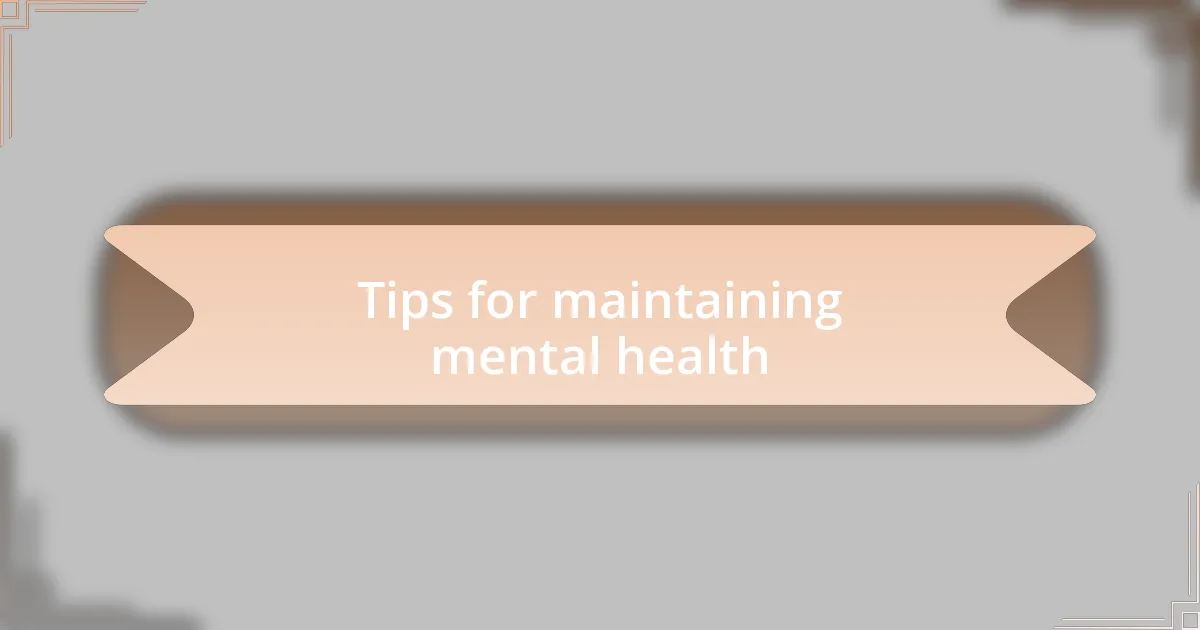
Tips for maintaining mental health
Finding structure in my day was crucial for my mental health. I created a loose schedule that included time for work, exercise, and relaxation. Interestingly, I discovered that setting specific times for activities kept me grounded and provided a sense of purpose. Have you tried scheduling your day? It can make a world of difference.
I also leaned into mindfulness practices, which helped anchor my thoughts when anxiety crept in. Each morning, I’d spend ten minutes meditating on my balcony, focusing on my breath and the sounds of the world waking up around me. This quiet moment not only centered my mind but also filled me with gratitude for the little things I often overlooked. Have you explored mindfulness techniques? They can really transform your mental space.
Connecting with friends over virtual coffee became an unexpected lifeline. I remember those evenings filled with laughter and shared stories, where we could momentarily forget the pandemic’s weight. It was a reminder that, even from a distance, relationships could flourish. Have you maintained connections during difficult times? Social support is vital for preserving mental health.